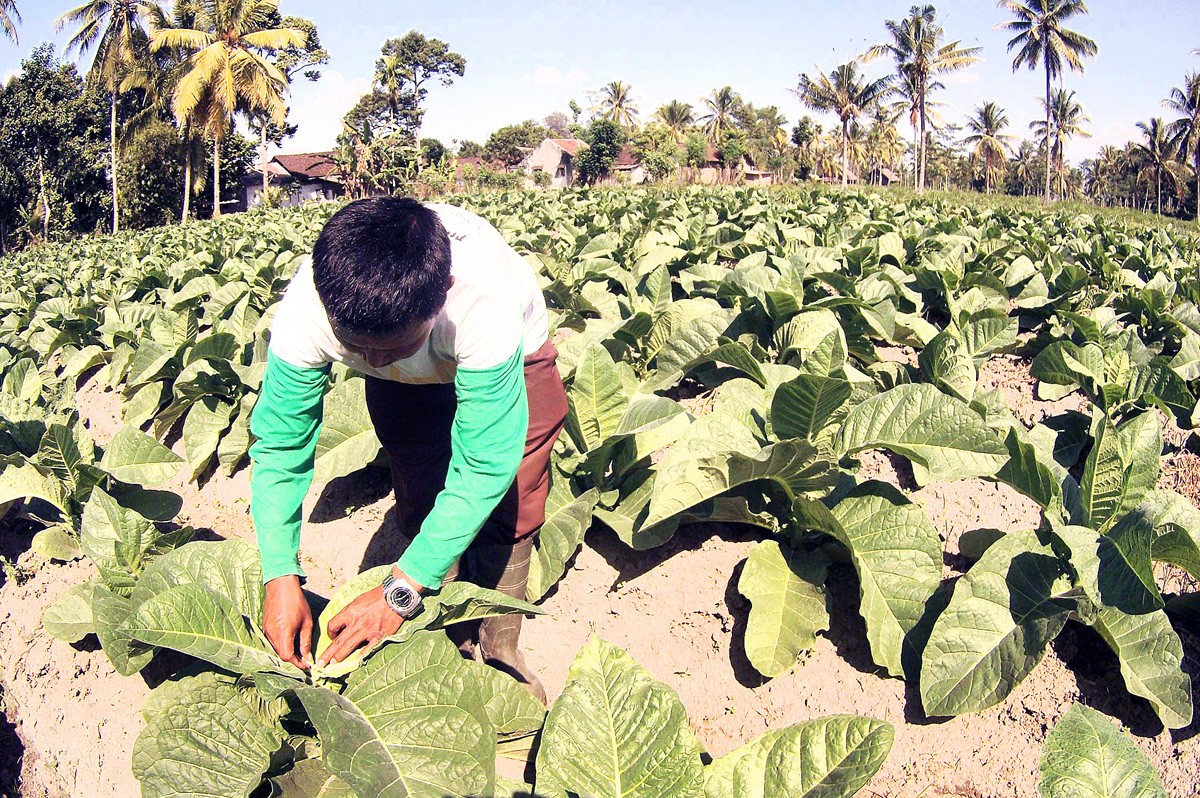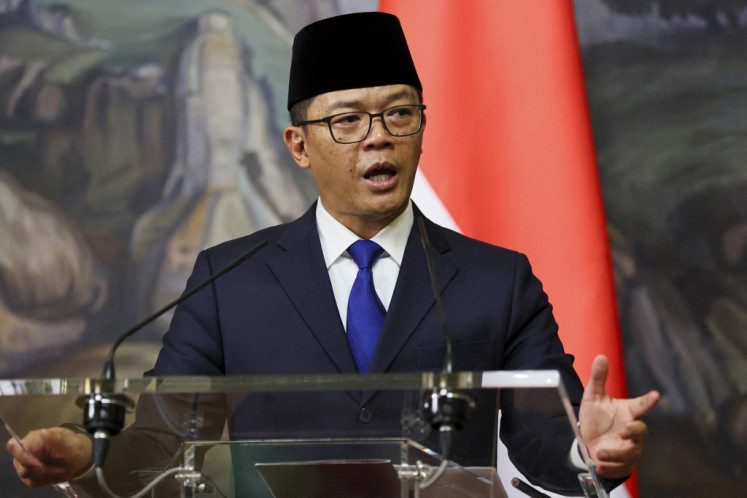Popular Reads
Top Results
Can't find what you're looking for?
View all search resultsPopular Reads
Top Results
Can't find what you're looking for?
View all search resultsExpensive cigarettes, why not? — Survey
Change text size
Gift Premium Articles
to Anyone
 Up in smoke: Tobacco farmer Sunaryo works at his farm in Randuagung village, Jember, East Java, on Tuesday. Tobacco business players expect the government to consider the industry when increasing tobacco excise, especially if it buys into a recent academic survey suggesting higher cigarette price of up to Rp 50,000 (US$3.78) per pack to support public health. (JP/Wahyoe Boediwardhana)
Up in smoke: Tobacco farmer Sunaryo works at his farm in Randuagung village, Jember, East Java, on Tuesday. Tobacco business players expect the government to consider the industry when increasing tobacco excise, especially if it buys into a recent academic survey suggesting higher cigarette price of up to Rp 50,000 (US$3.78) per pack to support public health. (JP/Wahyoe Boediwardhana)
R
idwan Adrianto, 27, says he would not mind if the price of cigarettes, which he smokes daily, doubled or even quadrupled to Rp 50,000 (US$3.8) per pack, although it would mean he would have to make sacrifices and eventually give up his habit.
“Then I’ll be forced to smoke less and eventually get rid of my smoking habit,” said the Jakarta-based employee of a consulting services company who, like many Indonesians, started smoking as a curious teenager. “I’ve been trying to cut down on smoking but it’s been difficult.”
Like Ridwan, around three-quarters of 1,000 respondents — including smokers — surveyed by the University of Indonesia’s (UI) Center for Health Economics and Policy Studies agreed that the price of cigarettes should be doubled, and the taxes raised used to fund the National Health Insurance (JKN) program.
The survey, which went viral on social media and stirred up controversy among netizens, noted that the ideal price to discourage people from smoking and support public health in general was Rp 50,000 a pack. Currently, cigarettes in Indonesia range from Rp 12,000 to Rp 20,000 per pack.
It emerged at a time when Indonesia, which hosts the world’s fourth-largest population of smokers, is pushing efforts to reduce smoking, from requiring pictorial health warnings on cigarette packs, to banning cigarette companies from any promotional activities at sports and youth events as well as a consistent increase in the tobacco excise.
The Indonesian Consumers Foundation (YLKI) is also supportive of the idea, as it would not only reduce the number of smokers in the country, who account for a third of the population, but also reduce poverty and improve health.
“It’s about time that cigarettes were sold with an expensive price tag as an instrument of limitation and control,” YLKI chairman Tulus Abadi said in an official statement.
If cigarettes were expensive poor families would buy fewer and families would be healthier with less smoking and less exposure to second-hand smoke, he added, claiming that they could save the money usually used to purchase cigarettes.
The government said no decision had been made regarding excise charges for cigarettes next year, although the levies regularly increase every year. The Finance Ministry’s Customs and Excise Directorate General will need to sit down with the Industry, Trade and Agriculture ministries before further raises as they would impact the tobacco industry and farmers.
“If there is an increase in 2017, we will announce it within three months to give a chance for all parties to make adjustments,” Customs and Excise Director General Heru Pambudi said, adding that the government would take into account factors such as health concerns as well as tobacco farmers’ and factory workers’ welfare.
Industry players have expressed outrage at the survey, especially if the government buys into the idea.
“We must examine the wisdom of a drastic increase in prices or excise duties because every policy that is related to cigarette prices and excise must consider all aspects comprehensively,” wrote publicly listed cigarette maker HM Sampoerna’s head of regulatory affairs, international trade and communications, Elvira Lianita.
The aspects include each link in the national cigarette industry chain, from farmers, workers, factories to vendors, as well as the industry’s situation and the people’s purchasing power.
A drastic increase in cigarette prices would expose Indonesia to the risk of illegal cigarette production, Sampoerna said. The Indonesian Cigarette Producers Association (Gappri) agreed, saying that a fair price increase would be similar to the inflation rate of around 5 percent, while cigarette prices have increased 11 percent per year on average in the past few years.
The Indonesian Hand-Rolled Cigarette Workers Community (MPSI) said 1.5 million hand-rolled cigarette workers around the country would suffer from massive layoffs should there be any drastic price adjustment.
“Then the problem is whether the government is prepared for all the consequences?” MPSI chairman Djoko Wahyudi said.
Prima Wirayani contributed to this story









